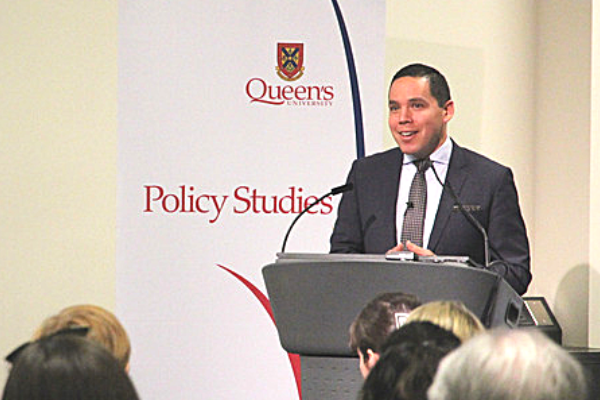Recognizing Inuit governance in Canada
March 9, 2018
Share

Inuit face an uncertain future in the face of climate change, says the leader of Inuit Tapiriit Kanatami (ITK), the organization protecting and advancing the rights and interests of Inuit in Canada.
“We’re not just canaries in an arctic coal mine,” says Natan Obed, who delivered the recent Tom Courchene Distinguished lectureship. “We are people with policy positions, and we’re here not just to tell our stories of our climate warming, but also to talk about what we need to do for mitigation and adaption. We work internationally and domestically to ensure we have an arctic to give to our future generations.”
Mr. Obed explored the challenges that many Inuit face today, including nutrition and food security, lack of housing, income disparity, youth suicide and health issues.
He also shared his perspective on the role of Inuit people and governance in Canada. He asked his audience to consider Canada’s current relationship with Indigenous peoples through the rights-based lens of Inuit self-determination.
“Instead of owning and managing resources, such as a mine in Voisey’s Bay – which could have made Nunatsiavut Inuit some of the wealthiest Canadians, with the best school systems the country, revitalized local language, and high economic development – we receive a percentage of tax revenue through the provincial government, and an impact benefit agreement,” says Mr. Obed. “While helpful, these still imagine that Inuit are on the fringes of any natural resource projects or benefit.”
As president of the ITK, Mr. Obed represents Inuit Nunangat, made up of four regions of the Inuit; Inuvialuit Settlement Region in the Northwest Territories and Yukon, Nunavut, Nunavik in Northern Quebec, and Nunatsiavut in Labrador. In addition to preserving Inuit rights, culture, and languages, ITK represents the Inuit before the federal and provincial governments.
“It’s important to respect Indigenous governance,” says Mr. Obed. “We have our own governance model, and we haven’t just decided to take on dominant Canadian and western governance models that we don’t necessarily believe in. There is still a long way to go to achieve respect for Indigenous governance. Provinces and territories do not get to decide which Indigenous peoples or representatives are or are not at the table. Indigenous peoples should work together to come to an understanding of how an Indigenous democracy works with a Canadian democracy."

Inuit health is of great concern, says Mr. Obed. “Our life expectancy is a full 10 years less than that of non-Inuit Canadians. In a developed country, we face a tuberculosis rate of 275 times that of other Canadians born in Canada. This isn’t something that’s just happened – we’ve had an elevated rate of tuberculosis since the 1950s.
There are vast gaps between the outcomes of Inuit and Non-Inuit in Inuit Nunangat, and they are often driven by policies. The administration of those policies, which are directed towards the improvement of our lives, often don’t flow through our organizations. A key development in the quest for self-determination is to ensure that Inuit have control over where these funds go and how they are spent."
The Policy Speakers Series continues until the end of March. The next named lecture is the Gibson Lecture on Thursday, March 15, presented by Professor Emeritus Robert Wolfe (Policy Studies), titled ‘Renegotiating NAFTA: A new model for North American economic (dis)integration’.
For more information about the rest of the winter term lineup, see the Policy Speakers Series website.